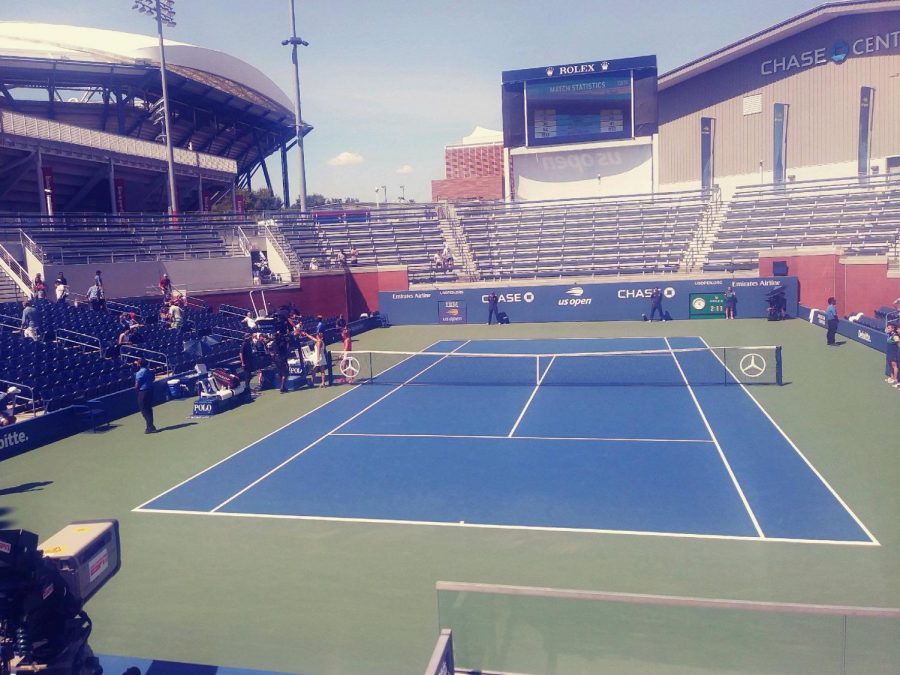COVID-19 outbreak causes major sporting events to cancel or reschedule, leagues discussing possible ways to resume seasons
The U.S. Open Tennis center near New York City, pictured here last summer, has become a field hospital during the battle against COVID-19
April 22, 2020
It’s safe to say the coronavirus pandemic has impacted the sports world more profoundly than any other event in history.
Some sporting events have opted to cancel all together. The NCAA March Madness basketball tournament and all of this season’s remaining winter and spring college sports for that matter.
There will be no Wimbledon at the All England Club this year for the first time since WWII. Nearby Royal St. George’s Golf Club, host of this year’s British Open, also opted to cancel, the first time since 1945 as well.
Still more iconic events have been rescheduled for unusual times of the year.
Golf’s first Major tournament of the year, The Masters is normally played the first week of April. This year, fans will have to wait until the week of Nov. 9 to see if Tiger Woods can defend his title. The season’s second Major, the US Open, usually in June, has been moved to Sept. 17-20. Coincidently, this year’s host is Winged Foot Golf Club, just north of New York City, considered to be the epicenter of the COVID-19 outbreak in the U.S.
An interesting footnote to the scrambled up sports seasons is that the U.S. Open tennis tournament which this reporter covered for NEVN last year, will be scheduled in the same month as the U.S. Open golf tournament for the first time in history. In fact, the entire US Open site, the massive United States National Tennis Center complex at Flushing Meadows in NYC is currently being set up as an emergency 350-bed field hospital and commissary packaging 25,000 meals each day for medical professionals. The French Open, another iconic tennis tournament, has always been played in June. This year it will start Sept. 20 and will crown its champion on Oct. 4.
Auto racing’s Indianapolis 500, run every Memorial Day weekend, will take place on Sunday, August 23rd instead.
The Kentucky Derby, horse racing’s premier event and the first leg of the Triple Crown, normally held in May, has been moved to Sept. 5. It could instead wind up being the third and deciding leg in this year’s Triple Crown.
The Boston Marathon, which was disrupted by the infamous 2013 bombing that sparked the BostonStrong campaign, is normally held on Patriots Day in April. It will now be run on Sept. 14.
Cycling’s most prestigious event, The Tour De France, a three-week test of endurance normally held in June and July has been rescheduled for Aug. 29 to Sept. 20.
Even the Olympic Games, which were to be contested this summer in Tokyo, Japan, have been postponed until the summer of 2021.
Three of the four major US sports leagues are on hiatus, and are currently exploring ways to finish — or even start their seasons.
The NBA, who suspended their season first, seems to be the furthest along with an actual plan to resume playing.
Michael Shapiro reported for Sports Illustrated that even though the league has not set an official date for a return to action, they are preparing a 25 day plan as a precursor to the resumption of the season.
The article claims that ESPN reported on Sunday, that the plan includes 11 days of individual workouts followed by a 14 day training camp before the season would resume.
It appears that Major League Baseball is continuing to consider a plan to start their season in a limited number of locations and undoubtedly without fans. Phoenix is still one of the locations under consideration by the MLB, but according to a CBS report by R.J. Anderson, the league has added Arlington, Tex. and St. Petersburg, Fla. to the possible list. The cities would represent the three hubs which would host games at major and minor league facilities.
The NHL seems to have the least developed plan of the three largest leagues who have suspended their seasons. Elliotte Friedman reported for Sportsnet California that the league is considering Ralph Engelstad Arena in Grand Forks, North Dakota as one possible venue for games if the season restarts. The arena hosts the University of North Dakota Fighting Hawks and, in years past, the World Junior Championships and the World U-18’s. Long-term hotel accommodations for players and staff would be limited, but North Dakota’s low population density would make it relatively safe from coronavirus.


